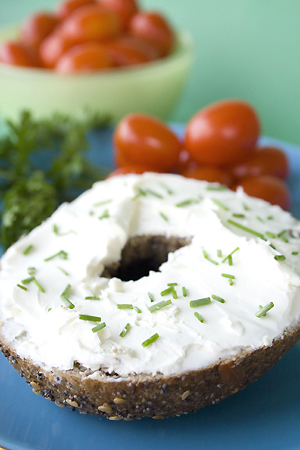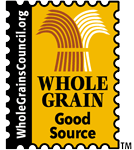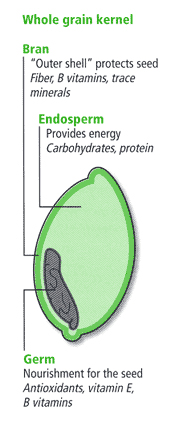 |

| |

The guilt-free bagel (we won’t talk about the cream cheese): It delivers two servings of whole grains per day, it’s only 260 calories (regular bagels can be twice that and more)...and it’s delicious. Shown: the Sprouted Healthy Hemp bagel. Photography by Claire Freierman. |
| WHAT IT IS: Large, whole grain bagels. |
| WHY IT’S DIFFERENT: Bagels that are good for you, made from whole grains and sprouted grains. Bagels made without sweeteners (your regular bagels probably have HFCS or another sweetening agent). Bagels that are the right size, not overblown, so that you can enjoy the entire bagel for 260 calories instead of twice that. (Check the real weight and calorie count of the bagels you normally eat.) |
| WHY WE LOVE IT: Low calorie, tasty and a bagel. |
| WHERE TO BUY IT: FrenchMeadow.com |
|
|
 |

French Meadow Bakery:
Healthy, Whole Grain Organic Bagels
Page 2: What Are Whole Grains & Sprouted Grains
This is Page 2 of a three-page article. Click on the black links below to visit other pages.
INDEX OF REVIEW
MORE TO DISCOVER
|
What Are Whole Grains & Sprouted Grains?
About Whole Grains
Whole grains are cereal grains that have not been refined: The bran (which contains the fiber, B vitamins and minerals) and the germ (which contains antioxidants, B vitamins and vitamin E) have not been removed. Refined grains have only the third part, the endosperm (which contains the carbohydrate and protein)—the nutrients have been removed (see the chart below). Even if a refined flour is enriched, only some of the B vitamins, plus iron, are added back.
The nutrients in whole grains can help lower risks of heart disease, high blood pressure, type 2 diabetes and certain cancers. The U.S. Dietary Guidelines, released by the U.S. Department of Agriculture in 2005, recommend that Americans consume at least half of their grain servings as whole grains. That means three to five servings of whole grains per day. One serving equals:
- 1 slice of whole grain bread
- ½ whole grain English muffin or bagel
- ½ cup cooked oatmeal
- ½ cup cooked whole wheat pasta
- ½ cup cooked brown rice, bulgur, barley or other cooked
whole grain
- 2 cups cooked popcorn
Whole grains include amaranth, barley, brown rice, bulgur, corn, millet, oats (and oatmeal), popcorn, spelt, sprouted grains, quinoa,  whole wheat flour and others. Look for products that list whole wheat flour as the first ingredient or have “whole grain” attached to the first ingredient listed on the package label—for example, “whole oats.” Some products also carry the Whole Grain Stamp developed by the Whole Grains Council. whole wheat flour and others. Look for products that list whole wheat flour as the first ingredient or have “whole grain” attached to the first ingredient listed on the package label—for example, “whole oats.” Some products also carry the Whole Grain Stamp developed by the Whole Grains Council.
Illustration courtesy of Wikipedia.org. |
 |
About Sprouted Grains
Grains, seeds and nuts can be sprouted (think alfalfa, mung bean and radish sprouts). Many grains, including several that we typically eat in their more conventional milled-flour form (like wheat, barley, rye and buckwheat), can easily be sprouted to take advantage of the higher nutrition of sprouts (if you’re interested in how this happens, or want to sprout your own grains, you can find plenty of websites that take you through the process). A sprouted cup of these grains can contain as much as 25% of the recommended daily value for protein plus all nine essential amino acids, high levels of vitamins A, B, C, E and K plus calcium and magnesium. These same sprouts, that have been familiar as additions to salads and sandwiches and which make pretty plate garnishes, also make delicious bread products.
In addition to being beneficial to healthy people (they are rich in protective antioxidants), sprouted foods help people with digestive issues. When grains, seeds and nuts germinate, they retain their plant enzymes, which makes them much more easily digestible (sprouted grains are often recommended to people with irritable bowel syndrome and gluten allergies for this reason). Sprouting the grains completely, as French Meadow Bakery does, and using a yeast-free natural leavening process, are both very important to break down the complex carbohydrates and make the bread more digestible (and also so the body can absorb more of the nutrients). People who eat probiotic food should consider sprouted grains as well—they encourage friendly bacteria, keep the colon clean.
Continue To Page 3: Varieties Of French Meadow Bakery Bagels
Go To Article Index Above
FOR ADDITIONAL INFORMATION, special offers,
contests, opinion surveys, THE NIBBLE
prior issues archive, product gift-finder and more,
visit the home page of TheNibble.com.
Do you have friends who would enjoy THE NIBBLE?
Click here to send them an invitation to sign up for their own copy. |
© Copyright 2004-2026 Lifestyle Direct, Inc. All rights
reserved. All information contained herein is subject to change at any time
without notice. All details must be directly confirmed with manufacturers, service
establishments and other third parties. The material in this e-zine may not
be reproduced, distributed, transmitted, cached, or otherwise used, except with
the prior written permission of Lifestyle Direct, Inc.
|
 |

|
 |




 whole wheat flour and others. Look for products that list whole wheat flour as the first ingredient or have “whole grain” attached to the first ingredient listed on the package label—for example, “whole oats.” Some products also carry the Whole Grain Stamp developed by the
whole wheat flour and others. Look for products that list whole wheat flour as the first ingredient or have “whole grain” attached to the first ingredient listed on the package label—for example, “whole oats.” Some products also carry the Whole Grain Stamp developed by the 

